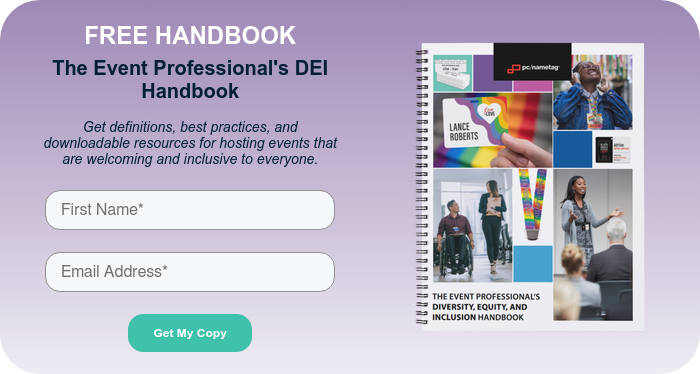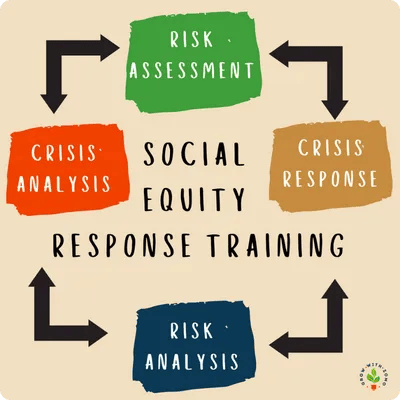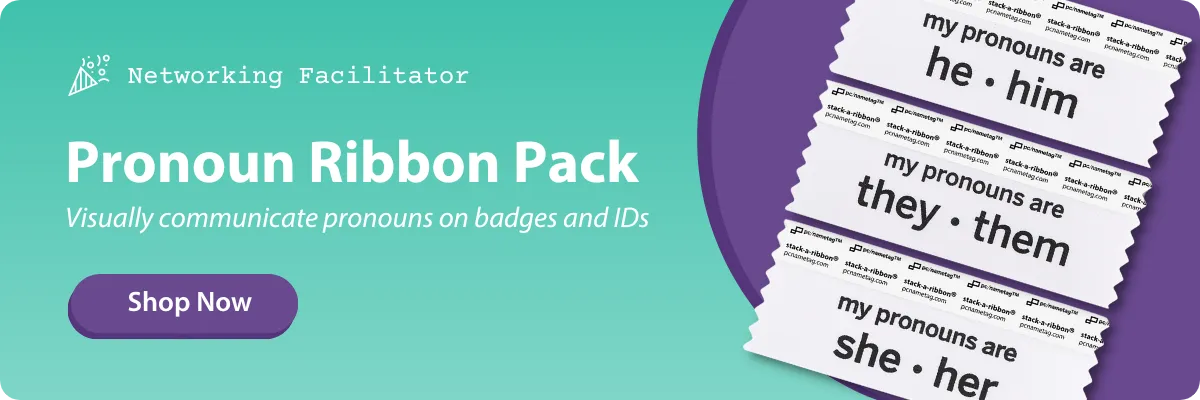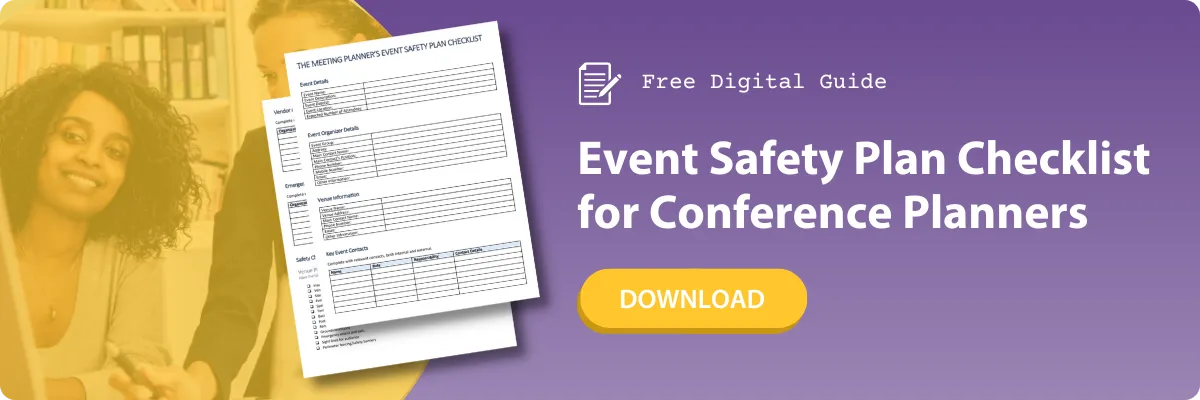Reader’s Note: The following blog is the first in a series by guest authors Zoe Moore, a Strategic Equity, Diversity and Inclusion Consultant, and Tim Mousseau, a keynote speaker and safety researcher. We’d like to thank Zoe and Tim for their contribution. Stay tuned for the next installment!
"What would you do?" Hospitality professionals often experience situations that force us to answer this hypothetical question. For instance, what would you do if you overheard a hospitality staffer being misgendered, barraged with discriminatory expletives, inappropriate euphemisms, or prejudicial remarks? How would you respond as a guest? A colleague? A general manager?
The question "What would you do?" prompts curiosity and helps us reflect on the best ways to think and respond during intense situations. This is why social equity should be a part of every event professional’s risk management plan.
It’s up to you to provide training that familiarizes your team with procedures for equitably engaging with all social identities when social, relational, and psychological conflict or harm arises. Read on to learn more.

Table of Contents
- What is social equity?
- Social equity examples
- Why social equity matters
- Top risk management statistics
- 4 elements of social equity training
- Sign up for Social Equity Response Training
Meet the Industry Experts
 |
Chiriga “Zoe” Moore, MS, CDP is a Strategic Equity, Diversity, and Inclusion (EDI) Consultant at Grow With Zomo. She helps leaders operationalize policies, develop training, establish committees, and implement strategies that support inclusion. She also is proudly trained as a Certified Diversity Practitioner by the National Diversity Council and helped launch the Event DEI Strategist Course powered by Event Leadership Institute. |
 |
Tim Mousseau is a trusted keynote speaker who leverages storytelling and workshops to teach about safe workplace culture. Using empathy as a guide, Tim empowers individuals to feel safe, drive engagement, foster creative decision-making, and build a deeper sense of belonging Over 400 organizations, including MPI, IMEX, and SHRM, have partnered with Tim to provide leaders with the skills, tools, and practices necessary to focus on feelings of safety. |
What is Social Equity?
Social equity is the practice of evaluating, learning, and implementing methods that promote fairness, justice, and equal treatment for all members of society—respecting their race, ethnicity, gender, socio-economic status, and intersectional social identities.
The goal of a Social Equity Response (SER) is to address and redress historic and systemic inequalities in our behavior to ensure everyone is afforded the same experiences, interactions, and respect.

Examples of Social Equity
The concept of social equity takes into account systemic inequalities to ensure everyone in the workplace and at your events has access to the same opportunities and outcomes.
There are a variety of ways to create safer, more effective spaces for the people around you. Examples of social equity include the following:
- Avoiding being complicit with discriminatory, prejudicial, or racist verbal abuse, especially when it is targeted towards (or expressed by) someone attending your event.
- Understanding how to respond when a person on your team is being misgendered, such as using the wrong pronouns when talking to or about someone.
- Responding correctly when a person is being unfairly treated by security, especially because of a person's race, ethnicity, or national origin.
- Taking steps to respond equitably when two conflicting political groups are present in the same space or at the same event.
- Familiarizing yourself with federal, state, and local public accommodation laws to hold yourself accountable for putting a stop to discriminatory, prejudicial, or racist behavior that may be verbal or psychologically harmful.

Why Social Equity Matters
Organizations need training on how to respond to social, relational, and psychologically harmful conflicts such as targeted microaggressions based on race, gender identity, sexual orientation, and so on. Team members must know how to engage with emotionally charged groups polarized about human rights topics just steps from their venue, event, or tourist site.
Psychological harm is the key ingredient of social conflict. Emotional stressors experienced through attitudinal prejudice, discrimination, xenophobia, sexism, and ableism can result in wounds far more common and painful than a punch.
The hospitality, events, and tourism industries must upgrade their risk management plans to go beyond the current hyperfocus on physical clashes to address social conflict; this strategy may very well establish a higher standard of social behavior.
Speaking Up for What's Right
When a resort CEO told women at a B.C. conference to 'go clean some rooms and do some dishes,' Trina Notman knew she had to speak up. Her response to the incident received more than 80,000 views.
She stated Social Equity Response training is necessary because “It is important for meeting planners to decide beforehand what is acceptable and what is not, and to create the Code of Conduct for their event that is signed by every presenter and communicated to every delegate. Then, they need to be ready to act when something happens. When there is a lack of action, you tell every person in that room that the behavior is acceptable and tolerated.”
 |
Trina Notman, VP Marketing & Communications at Accent Inns |

Social Equity and Your Event Risk Management Plan
Take a moment to think back to your elementary school days. Many of us endured response drills to help us prepare for the unexpected. An alarm would ring, and we’d know exactly what to do. We’d follow instructions, abide by signage, and repeat behaviors we learned through numerous exercises.
Humans thrive on routines. If our clothes catch fire, we stop, drop, and roll. In the case of an active shooter, we tell attendees to run, hide, or fight to save their lives.
As an event professional, do you have the same training on how to respond when someone faces an identity-based psychological or emotional threat?
Generally, hospitality professionals are trained to respond to physical incidents. We learn how to react if someone is about to throw a punch, brandish a weapon, or use a vehicle with the intent of doing bodily harm.
However, there is little-to-no training provided on handling incidents that perpetrate psychological or emotional harm. In the hospitality industry, this training is invaluable because we're in the business of people.

When your blood pressure is elevated, your breathing is rapid, and your heart feels ready to implode, it can be difficult to know how to respond to an unexpected situation. This is why repetitive drills are essential, as they help people react properly in the event of an emergency and create ingrained behaviors that help people respond calmly in tense situations.
Drills are core to risk management plans because they help planners, venue managers, and destination organizers think critically about emergency preparedness, response, recovery, and mitigating conflict. Drills help counter the body's natural stress responses of fight, flight, freeze, or fawn.
Risk Management Statistics in the Hospitality Industry
Despite the hospitality industry’s emphasis on risk mitigation, a survey of over 500 hospitality, events, and tourism professionals revealed that not only do they feel ill-prepared to handle a physical altercation, but they felt ten times more unprepared to manage social conflict between themselves versus teammates, teammates versus patrons, and patrons versus patrons.
A lack of preparation around managing social conflict increases the likelihood of a toxic workplace culture and harm that adversely impacts both employees’ and patrons' experiences. Numerous studies have shown that the same neurological stress responses that occur during physical threats also happen when people face psychological harm.
Healthy resolutions start with making sure guests and employees feel safe enough to speak up and address moments of social, psychological, emotional, or identity-based harm. Unfortunately, based on original research that Create Safe conducted in 2022, their study found that first-time attendees are significantly less likely to speak up about concerns related to these situations.
Many respondents shared perspectives that organizations might not adequately address their concerns. Others worried that the professional support staff did not have the tools, resources, or policies to create effective change.
Further, the EEOC estimates that 70% of people who face an incident of toxicity or harm in a professional setting do not come forward about their experiences. When building out risk management strategies, professionals and organizations must work to prevent all forms of harm.

4 Elements of Social Equity Training for Hospitality Professionals
Social Equity Response (SER) training familiarizes destination leaders, hotel staff, venue managers, and event organizers with procedures for equitably engaging with all social identities when social conflict or psychological harm arises.
The goal of SER is to reduce incidents of being complicit in biased behaviors, attitudes, prejudices, and discriminations that result in psychological unsafety. Incorporating Social Equity Response procedures helps companies accomplish the following:
- Prioritize recurring training and drills
- Facilitate helpful dialogue with stakeholders
- Foster a proactive focus on upgrading policies.
- Adopt systemic practices reinforced by team members
Social Equity Response training will vary by company, but typically uses the four existing tenets of a risk management plan: Risk Assessment, Risk Analysis, Crisis Analysis, and Crisis Response. Read on to discover more.

1. Event Risk Assessment
Hospitality professionals often develop their own social engagement skills simply by interacting with co-workers and guests. However, they rarely engage in any formal training. Preventing social conflict and psychological unsafety is a must.
Throughout our research across 97 organizations with 397 employees and 97 managers, we found that leaders overestimate their people's skills in identifying and managing psychological safety concerns. Leaders also overestimated their staff's willingness to share about the safety violations they personally experienced.
By assuming that people in the workforce know how to handle socially tense situations, leaders are setting up the potential for harm between employees and patrons or inadequate responses to safety violations. Without an intentional approach, incidents can lead to poor employee retention, guests publicly sharing negative perceptions, or even escalation to expensive litigation.
→ Event Risk Management Goals
Risk Assessment helps senior leaders, managers, and employees identify the potential risk of various types of social conflict that could occur in their location or at their event. This could range from misgendering an individual to a discrepancy in scheduling between representatives from two conflicting social activist groups.
Multiple meeting aspects can influence these vulnerabilities, such as the event location, the political views of those contributing, and the behaviors of the local population. When risks are ignored and go unidentified, the outcomes can be detrimental to attendees' experiences and the space created by the company.
2. Event Risk Analysis
Having a sophisticated plan for every possible safety incident is not feasible, but failing to mitigate situations equitably can result in a damaging backlash that brands a company as complicit in discriminatory behavior.
Our research also indicated that people who experience harm place some degree of accountability on the overarching organization and those in power, regardless of their involvement in an incident.
→ Event Risk Analysis Goals
Risk Analysis aims first to reduce the probability of an occurrence, and then limit the consequences of the perceived harm while holding the involved parties proportionately accountable. Unlike traditional plans that list ways to transfer risk to external entities, Social Equity Response requires a balance of individuals taking appropriate action reinforced by organizational empowerment.
Everyone on your team needs to be clear about when boundaries have been crossed and their responsibility to address social conflict. For example, an A/V technician that mutes the mic of a speaker and cues music in response to discriminatory words expressed on stage must feel confident that those in charge will support them. Above all, employees must trust that leadership will support their actions; this trust is built by incorporating clear policies and allocating the right resources.

3. Event Crisis Analysis
When disrespectful behavior from guests is incentivized or disparaging comments by speakers are tolerated, a business's reputation is put in jeopardy. Conducting a Risk Assessment and Risk Analysis allows a business to be more prepared to handle an incident violating someone’s identity, dignity, and humanity.
As quickly as a harmful incident can occur, someone can immediately withdraw their support, share their negative experience on social media, or incite a boycott.
→ Event Crisis Management Goals
Crisis Analysis addresses the possibility of a situation escalating or going viral, whether this means proactively interacting with community members, public protesters, city leaders, and other stakeholders.
Communication is vital regardless of public and private responses. An organization that attempts to ignore an incident or the current political climate will be perceived as out of touch. A company that hastily takes a position without all the details will be sullied and divisive. Crisis Analysis is needed to avoid misalignment between the organization's values and decisions, especially in the aftermath of social conflict.
4. Event Crisis Response
The external response to a crisis may not always be immediate. Highlight reels have gone back years to compile the discriminatory missteps of celebrity figures, political candidates, and company CEOs. No matter your view on “cancel culture,” at its core, it demands accountability.
Crisis Response is how a company chooses to make measurable and sustainable changes to acknowledge and overcome the harms of social conflict. Responses can include accepting the behavior, seeking remediation, or implementing new policies that cement their commitment to equity, diversity, and inclusion (EDI).
→ Event Crisis Response Goals
Some hospitality, events, and tourism leaders may attempt to excuse themselves from the dialogue about social injustice by defaulting to the classic "neutral" stance. However, they can't ignore the industry's economic significance tied to political outcomes and human rights challenges.
As far back as 2016, planners pulled their events from North Carolina over the passing of bathroom bills. In 2021, Major League Baseball yanked the All-Star Game from Atlanta over voter suppression laws. A Crisis Response recognizes that optics alone will not suffice in communities that have endured marginalization. Supporting these communities requires an investment of time, money, resources, and authentic expressions of solidarity.

Social Equity Response Training: How to Learn More and Enroll
Ask Yourself: What did you do when faced with the responsibility of living your values out loud? How do you resolve a conflict between two polarized groups? How do you serve as an ally in the workplace and defend a team member's identity? How do you react when a keynote speaker makes an offensive remark at an industry event?
When in doubt, pursue training to learn techniques, initiatives, and practices to ensure future success. Social Equity Response Training prepares you and your team for circumstances beyond physical altercations or bodily harm. Through recurring drills, training, facilitated dialogue, and equitable policies, companies will see the value in upgrading their risk management plans.
Stay Tuned for Part II of Social Equity Response, where Zoe Moore and Tim Mousseau dive deeper into how companies can design training programs to empower their workforce, partners, and senior leaders.





Submit a Comment